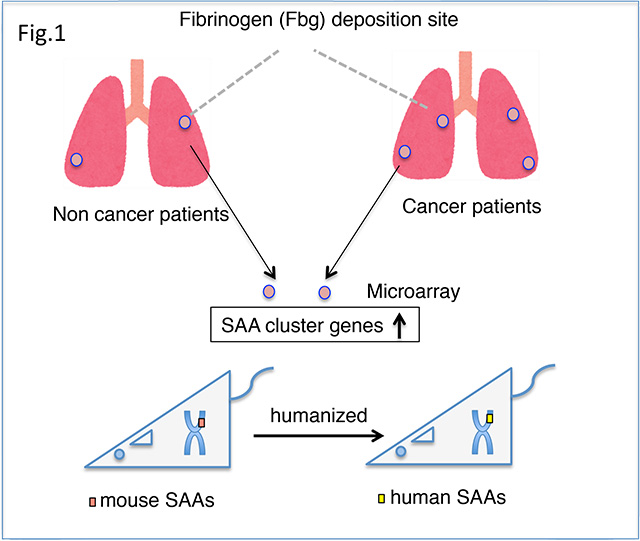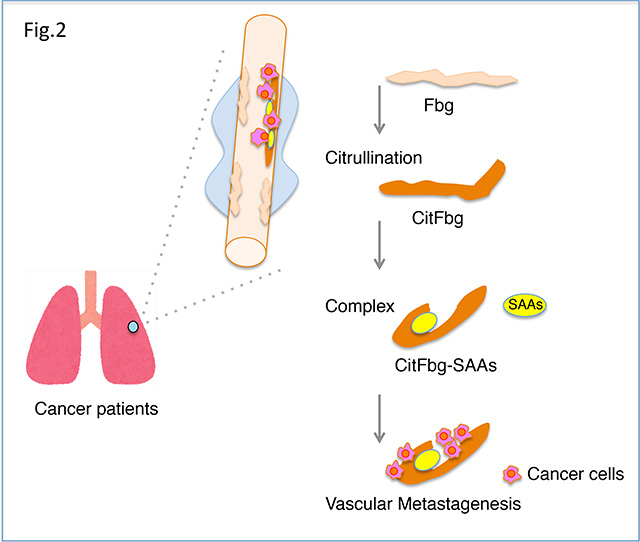The research group of Professor Sachie Hiratsuka of the Institute for Biomedical Sciences/Department of Biochemistry and Molecular Biology, Shinshu University School of Medicine, conducted a study of animals in which the gene group of serum amyloid protein was humanized. They confirmed that cancer cells metastasized in the lung where a complex of pathological fibrinogen and serum amyloid was deposited. This location is called the “premetastatic soil”. Humanized animal models also showed that a peptide (short protein) directed against pathologic fibrinogen reduced cancer metastasis. In addition, they developed specific antibodies against this pathologic fibrinogen and confirmed the presence of localized premetastatic soil in the lungs of cancer patients similarly to animal models.
With an aging population, cancer morbidity and mortality are on the rise. In terms of prevention, research into the development of the primary lesion has been the primary focus. Contrary to conventional (metastasis-directed) cancer, the research group demonstrated in an experimental mouse system that the host organ underwent an inflammation-like reaction prior to metastasis due to effects of the primary lesion. However, it remains unclear whether such a phenomenon also occurs in humans.
The process of primary cancer development and metastasis is similar to chronic or subacute inflammation. In mice with cancer, the coagulation system cascade is activated after hyperpermeability, and fibrinogen is deposited in blood vessels, starting with an inflammatory-like reaction in pre-metastatic organs, especially in lungs. Cancer cells that had invaded the blood were also observed as more likely to accumulate at this local site. In the lungs of people who perish from cancer, there is no apparent metastasis, although fibrinogen is found deposited in areas that may have increased hyperpermeability. In this study, pathologic (citrullinated) fibrinogen was present in very localized areas in the lungs of cancer patients and could be detected by specific antibodies. Their study suggests the potential to detect risk sites for metastasis in the lung before metastasis or at an early stage such as cancer cells engraft in blood vessels at the site of metastasis and is expected to develop detection of potential metastatic sites and early treatment for cancer-bearing patients in the future.
Detailed information about this study was published online on August 24, 2023, in Nature Communications of Springer Nature.
See below for details.
Title: Citrullinated fibrinogen-SAAs complex causes vascular metastagenesis
Authors: Yibing Han, Takeshi Tomita, Masayoshi Kato, Norihiro Ashihara, Yumiko Higuchi, Hisanori Matoba, Weiyi Wang, Hikaru Hayashi, Yuji Itoh, Satoshi Takahashi, Hiroshi Kurita, Jun Nakayama, Nobuo Okumura, Sachie Hiratsuka
Journal: Nature Communications
Published on August 24, 2023
DOI: https://doi.org/10.1038/s41467-023-40371-1
With an aging population, cancer morbidity and mortality are on the rise. In terms of prevention, research into the development of the primary lesion has been the primary focus. Contrary to conventional (metastasis-directed) cancer, the research group demonstrated in an experimental mouse system that the host organ underwent an inflammation-like reaction prior to metastasis due to effects of the primary lesion. However, it remains unclear whether such a phenomenon also occurs in humans.
The process of primary cancer development and metastasis is similar to chronic or subacute inflammation. In mice with cancer, the coagulation system cascade is activated after hyperpermeability, and fibrinogen is deposited in blood vessels, starting with an inflammatory-like reaction in pre-metastatic organs, especially in lungs. Cancer cells that had invaded the blood were also observed as more likely to accumulate at this local site. In the lungs of people who perish from cancer, there is no apparent metastasis, although fibrinogen is found deposited in areas that may have increased hyperpermeability. In this study, pathologic (citrullinated) fibrinogen was present in very localized areas in the lungs of cancer patients and could be detected by specific antibodies. Their study suggests the potential to detect risk sites for metastasis in the lung before metastasis or at an early stage such as cancer cells engraft in blood vessels at the site of metastasis and is expected to develop detection of potential metastatic sites and early treatment for cancer-bearing patients in the future.
Detailed information about this study was published online on August 24, 2023, in Nature Communications of Springer Nature.
See below for details.
Title: Citrullinated fibrinogen-SAAs complex causes vascular metastagenesis
Authors: Yibing Han, Takeshi Tomita, Masayoshi Kato, Norihiro Ashihara, Yumiko Higuchi, Hisanori Matoba, Weiyi Wang, Hikaru Hayashi, Yuji Itoh, Satoshi Takahashi, Hiroshi Kurita, Jun Nakayama, Nobuo Okumura, Sachie Hiratsuka
Journal: Nature Communications
Published on August 24, 2023
DOI: https://doi.org/10.1038/s41467-023-40371-1



